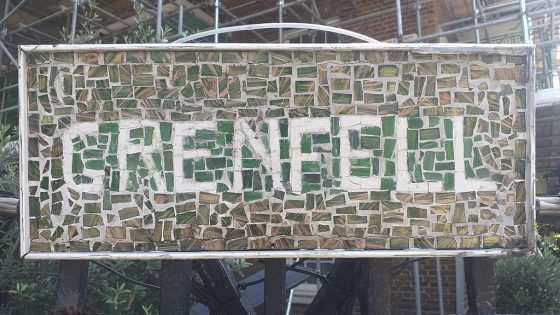The three manufacturers of cladding and insulation criticised by the Grenfell Inquiry have responded to the official inquiry’s findings, with one maintaining its product was safe.
Kingspan, Arconic and Celotex both set out detailed statements about their products following this morning’s release of the phase two report of the official inquiry into the 2017 tragedy.
Arconic, which manufactured the Reynobond 55PE panels used in external cladding fixed to the building, said the fire was “a terrible tragedy”.
It confirmed the subsidiary company, Arconic Architectural Products SAS (AAP), had supplied sheets of aluminium composite material that were used to manufacture the rainscreen fitted during refurbishment.
But Arconic said: “AAP sold sheets of aluminium composite material as specified in the design process. This product was safe to use as a building material, and legal to sell in the UK as well as the more than thirty other countries in which AAP customers purchased the product. We reject any claim that AAP sold an unsafe product.
The inquiry report concluded that Arconic had been aware for many years before the tragedy that the statements the company was making about the fire performance of Reynobond 55PE were inaccurate. The fire performance of asset-fixed panels was “significantly worse that that of riveted panels”, it said.
Arconic added: “AAP regularly conducted tests of its materials using third-party testing bodies. Reports on these results were all publicly available, and AAP made these reports available to its customers.”
The firm went further: “AAP did not conceal information from or mislead any certification body, customer, or the public.”
Celotex, whose insulation product made up 95 per cent of the building’s insulation, was found by the inquiry to have “embarked on its own campaign to break into the market by dishonest means”.
Insulation supplier Celotex marketed RS5000 as “the first PIR board to successfully test to BS8414” and as “acceptable for use in buildings above 18 metres in height”.
The inquiry found the claim had been “manipulated… a fact that Celotex did not disclose in its marketing literature”.
In a statement, the firm said it was now considering the report’s contents “with care”.
Changes since the 2017 fire included improved process controls, quality management and the approach to marketing within the Celotex business.
The statement said: “We conducted our own review to interrogate the circumstances in which the RS5000 product had been tested, launched and marketed. This review was a significant and thorough undertaking, and the results of that work were disclosed promptly and proactively to relevant stakeholders, including the Grenfell Tower Inquiry.
It added that independent testing commissioned following the review “demonstrated that the cladding system described in the Celotex RS5000 marketing literature met the relevant safety criteria”.
The firm added: “That system was substantially different to that used at Grenfell Tower. Decisions about design, construction and the selection of materials for the Tower were made by construction industry professionals.”
It added: “Celotex Limited continues to cooperate fully with all official investigations into the Grenfell Tower fire.”
In its response, insulation supplier Kingspan said it had “long acknowledged the wholly unacceptable historical failings” in its UK arm.
But its statement also said the actions that led to its K15 insulation product being used on the tower block without its knowledge “were in no way reflective of how we conduct ourselves as a group, then or now”.
It reiterated that K15 “was and remains safe to use” when installed correctly and used in compliance with building regulations.
The Grenfell Inquiry, led by Sir Michael Moore-Bick, found Kingspan’s K15 product only made up 5 per cent of the insulation on the building.
But the report concluded the firm’s marketing had been dishonest as it had created a “spurious” market for polymer-based insulation for use on high-rise buildings.
The report concluded that the development and marketing of K15 for use on buildings over 18 metres in height between 2006 and 2019 was “one of deeply entrenched and persistent dishonesty on the part of Kingspan in pursuit of commercial gain”.
The inquiry added the firm had shown “a complete disregard for fire safety”.
Kingspan’s statement said the actions of its UK division “were not found to be causative of the tragedy”.
It added that since the fire in June 2017, “significant controls and enhancements” had been implemented “at a global scale” by the Irish firm.
The statement said: “We welcome the publication of today’s report which is crucial to a public understanding of what went wrong and why. It explains clearly and unambiguously that the type of insulation (whether combustible or non-combustible) was immaterial, and that the principal reason for the fire spread was the PE ACM cladding, which was not made by Kingspan.”
It added: “Kingspan has long acknowledged the wholly unacceptable historical failings that occurred in part of our UK insulation business. These were in no way reflective of how we conduct ourselves as a group, then or now. While deeply regrettable, they were not found to be causative of the tragedy.”
Among changes made since the blaze, the company said it had now achieved global certification to compliance standard ISO 37301: 2021 for all of its UK manufacturing sites.
The firm added it had also dealt with “shortcomings” about the firm raised during the inquiry.
Kingspan re-committed to pay its share of remediation costs “where we have responsibility for the inappropriate use of K15”.
The firm also added: “We extend our deepest sympathies to those impacted by the tragedy.”

